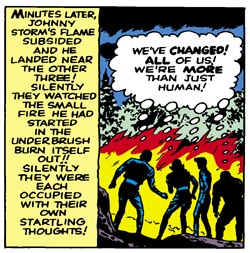

|
|
 |
|
|
| > Marvel Masterworks Library |
|
Click panels for larger images _________________________  Click panels for larger images _________________________ 
FANTASTIC FOUR CHECKLIST
FF PLAZA
_________________________ PRINT HISTORY &
Original 27
_________________________
ComicCraft
_________________________
Barnes & Noble Softcover |

Marvel Masterworks: Fantastic Four Volume 1 Reprints: Fantastic Four #1-10 (Vol. 2 in the Marvel Masterworks Library)
Current In Print Edition: Second Edition, First Print
REGULAR EDITION ISBN: 0-7851-1181-6 • List Price: $49.99 256 Pages
Scripted by Stan Lee Penciled by Jack Kirby Foreword by Stan Lee
On Sale: MASTERWORKS LIST "Hey look!" "Hmmm.... new Timely monster book." That's what I imagine a kid in 1961 would say finding the first Marvel comic on his spinner rack. Journey Into Mystery, Strange Tales and Amazing Adult Fantasy were giving readers regular doses of giant monsters. When Martin Goodman came to Stan Lee with the Justice League of America sales figures and told him to create a knock-off, it's pretty clear they didn't want to go too far off-brand from what was already working. So we get a giant monster taking up nearly the entire cover and four heroes in corners of the page. Big deal...nothing new! The super-powers the heroes showcase are also nothing new. The Thing's grotesque and mighty form echoes the monsters Timely had been churning out for decades, and the Frankenstein reference is certainly apparent for all to see. Also owing to literary horror is the Invisible Girl. Invisibility had been a staple of horror and science fiction since H.G. Wells' original novel. The Human Torch? Marvel (as Atlas) already had one! And Mr. Fantastic's visual flair owed more to Jack Cole's “Plastic Man” than the handsome scientists of countless b-movies. Nothing new! And yet the ten issues in this "nothing new" book changed everything. Not least of all changed was the comic's creators. Stan Lee, bored by comics, set out to make the first "anti-comic". The comic he imagined would understand the conventions and laugh at them, like Frank Miller (among others) would do in the 80's. At the time, he thought he was laughing himself out of a job, but as time has shown us, he was merely taking the risks and meeting the challenges that befit legends. And what of Jack Kirby? He didn't change his style to do this book, but in time the book would change him. The Kirby world, with each adventure, would become strange, wonderous and reach an epic scale that included the outer reaches of space, the distant paths of future and past, and the quantum redux of the Negative Zone. Given this wondrous playground to work in inspired and excercised the creative brain in Kirby, and he would never be the same. The World's Greatest Comic Artist was forged by the World's Greatest Comic Magazine. But with this volume, we're still a long way from the Galactus trilogy. When we meet Marvel's First Family, they have a lot of growing pains to groan through. Have you ever seen reruns the 'Simpsons' shorts in Tracey Ullman show reruns? And you're positive someone else is doing Homer's voice- someone different than the one who fixed that "Homer" voice in your imagination? Well, that's the feeling one gets here. Most comics see a slow and steady progression of identity and character as the series grinds on from ground zero, and Fantastic Four- despite its legacy of genius- is no different. But the good news is that progress comes quickly! Stan caves in by issue 3 and gives them all costumes, although they look much more like workmen's jumpsuits than the Avengers (the Thing's early attempt at a full-body suit and helmet is hilarious!) Both the Thing and Torch get more body definition as the issues roll on, with the Thing achieving a more rigidly rocky tone, and the Torch becoming less "flamy." The squabbling family idea takes form, with Sue providing the love interest to the brainy and sometimes aloof Reed Richards, with her younger brother Johnny Storm being the rebellious and scatter-brained teen. And Ben Grimm is cast as the tragic figure of a man stuck in a monster's body, in total possessions of his faculties but constantly aware of his monstrosity. And how about that Rogue's Gallery? Marvel's first uber-villain bows here (Dr. Doom,) as well as the space-faring shape-changers the Skrulls. Thorns-in-the-side villains like the Mole Man and Puppet Master are introduced (as is the lovely romantic foil Alicia Masters!) And of course, FF #4 sees the reintroduction of legendary Timely hero Namor, the Sub-Mariner, though this time around, Stan casts him as an anti-hero, a man of noble intentions undone by a lust for vengeance against the surface world. The question "is he good/is he evil?" would revolve in the minds of Marvel comics fans for years, and is another sign of the forward-thinking Stan Lee's genius at creating characters who's moral identities would provide a constant renewal of story ideas. This volume represents the time in Fantastic Four comics when Jack and Stan were sowing the seeds of superheroics and family melodrama; this would sustain the FF from the Silver Age to modernity and beyond. Welcome, Masterworks fans! The Mighty Marvel Age begins here! -- by Jonathan Clark, aka doesitmatter, with Gormuu -- panel images provided by Jonathan Clark
Issues Reprinted
|
|||||||||||
 FF #1 |
 FF #2 |
 FF #3 |
 FF #4 |
 FF #5 |
||||||||
 FF #6 |
 FF #7 |
 FF #8 |
 FF #9 |
 FF #10 |
||||||||
|
Website design by Doug Roberts and John Thomas. All images on this site are copyright of Marvel Comics. This site is for reference purposes and promotion of the Masterworks line of books as well as Marvel Comics and their properties. |
||||||||||||